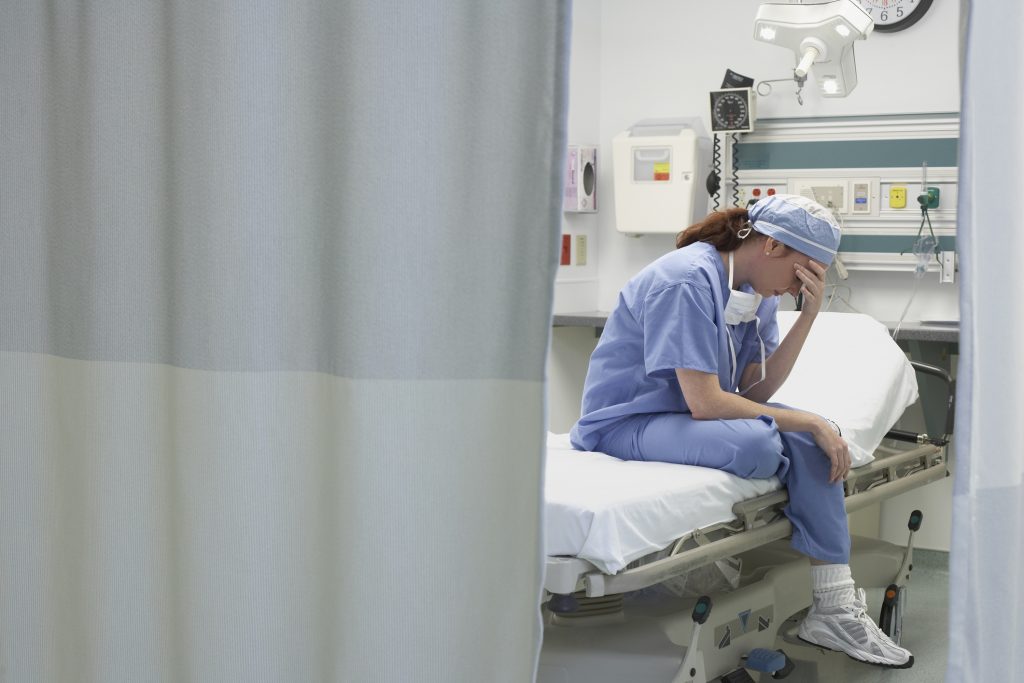“The health and well-being of the patient will be my first consideration,” is part of the revised Declaration of Geneva, which many doctors swear to along with the Hippocratic Oath. That brief statement has defined the medical profession’s statutes and what doctors represent in society, as well as their obligation to put the patient first. And while patient-centered care is the focus of most healthcare systems, the loss of a patient is sometimes inevitable.
While patients dealing with grief is often highlighted, many don’t acknowledge the grief that healthcare professionals experience themselves when a patient dies. From surgeons fighting to keep the heart beating on the operating table to nurses working with geriatric patients in elder care centers, they’ve all experienced grief at some point in their careers.

Failing to pay attention to employee grief may be affecting your patient experience — and you may not even know it. Lazlo Block, former Google Chief People Officer and cofounder of Humu, says, “There are many taboos at work and death is one of the greatest.” Doctors are taught to not show emotion – except for compassion – when delivering tragic news to waiting families. It’s part of the job, and many view healthcare professionals as an unshakeable force untouched by death in a field where they see it every day.
But this is not the case. Grief does, in fact, affect the performance of health care workers to one degree or another.
Employee grief as a catalyst for low engagement
Grief is a universal human experience. COVID-19 put this in stark relief, and healthcare workers on the front lines were faced with dying patients day in and day out, trying to keep themselves and family members safe. A study done in Canada looked at the way oncologists were impacted by patient grief, and the results highlighted that the doctors felt varying ranges of emotion, including sadness and anger, to disorders like insomnia and burnout. Surprisingly, however, many oncologists also pointed out that they felt a sense of failure. They’d sworn an oath, and they often felt directly responsible for the loss of their patient, and this typically began when they knew the prognosis couldn’t be turned around – even before death of the patient.
This sense of failure, self-doubt, and helplessness led doctors to walk a fine line between caring for their patients and also wanting to distance themselves from the pain they would feel if they lost said patient. In essence, grief-stricken healthcare workers may disengage to protect themselves.
Employee engagement is an integral part of the patient experience in a healthcare setting, and I previously wrote at length about how engaged employees work harder, believe in organizational values, produce greater returns on investment, and overall are likely to be retained. A disengaged employee, even for reasons of their own health, don’t add value for patients or offer enough compassion. Many can’t enact empathetic listening – a way to help patients with their care or grief – as they are themselves struggling.
This bottling of emotions has become commonplace in many work areas, and particularly within the healthcare system, which can view showing signs of grief as a weakness. This means that the employee may show irritability, impatience, lack of care or attention when performing their job. So how does failing to deal with employee grief affect patient experience directly?

Employee engagement and patient experience: a snapshot
Some of the key takeaways to look at when it comes to the direct correlation between lack of dealing with employee grief and its effect on patient experience:
- Low engagement, leading to low patient satisfaction scores. Low satisfaction scores from patients tend to mean a poor patient experience, just as high satisfaction scores tend to mean better patient experiences. Satisfaction scores can fluctuate along any touchpoint in the patient’s experience, from the admission process to the resolution of their care. Direct-care staff (like certified nurse aides, nurses, doctors, etc.) are not the only ones who must ensure that they are at their top form. Indirect staff (like admissions, coordinators, activities, administration) must also be careful to perform well along patient touchpoints.
- Lower retention rates. As staff members experience burnout or psychological issues, it’s possible to lose some of your best staff to grief. If they aren’t provided with support, or fell as if they aren’t part of a culture that looks at grief from a healthier perspective, this could lead to high turnover numbers. Losing great talent this way can greatly hurt a healthcare system, especially as many patients travel with doctors or nurses from system to system when they develop a bond with medical professionals.
- Impaired medical judgement. When a healthcare professional is blinded by their own grief, their focus isn’t where it should be: on the patient. This can lead to medical errors, misdiagnoses, or mistakes in treatment. Handling grief properly can stave off potentially critical problems down the line.
- Lower motivation to improve patient care. Distractions from losing a patient may create a sense of failure, and these distractions lower the value of subsequent care that medical professionals give to other patients, and decreases their motivation to take better care of current patients. They find themselves questioning decisions more, which can lead to slower response time to situations where prevention or quick action is critical. Their bedside manner, visits with patients, and support of other staff members also begins to suffer.
Ways to help with employee grief
You can help your staff members by creating a culture of support and openness when it comes to loss and grieving. Here are some tips to help you develop a strategy to identify and deal with employees experiencing grief:
- Help them remind themselves why they’re there. Patient “thank you walls,” conversations with therapists or staff, and focusing on positives can help staff remember what they loved about their job and what they do in the first place.
- Experience the grief. There is no need to bottle it up – it will have the opposite effect. Being free to experience this grief, take moments to feel their emotions and adjust can help the process of grieving be shorter and healthier.
- Offer therapy or counseling. After a loss, any staff should be offered access to professionals who can assist them with expressing how they feel, learn positive coping mechanisms, and help them identify their needs.
- Remove the stigma. Allow them to understand they aren’t alone. It doesn’t mean everyone has to share their trauma stories or burden each other, but grief should be met not only with compassion, but also empathy. Create a culture of acceptance and care.
- Give them time. This can be done through extra days off after a loss, adjustment to patient appointments, more time to meet goals or metrics, or break times. Grief takes time to heal. This isn’t done in the blink of an eye, and simple allowances can make a big difference.
- Create programs. Things like grief pay/days off, which can be handled differently from bereavement. Other ideas include check-in systems that are staff-focused and confidential, bonuses for taking “Me Days” during the year to refresh, or respite care for your employees. Any of these, and many more, can be very good ways to not only acknowledge that grief is part of existence, but also foster a healthy environment where it isn’t shamed or hidden.

Humanizing grief to connect with patients
In essence, doctors, nurses, and other medical professionals are human. They are no different from anyone else experiencing pain and going through the stages of grief. In fact, patients can find themselves bonding with doctors, or become more understanding, if they see healthcare professionals as people who care. Humanizing your staff and removing the stigma of expressing grief can mean the world to your patients.






